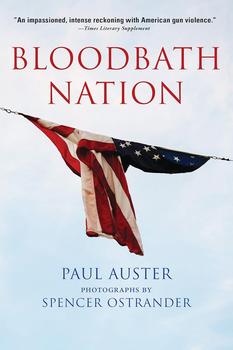Summary | Excerpt | Reviews | Beyond the Book | Readalikes | Genres & Themes | Author Bio

Excerpt
Bloodbath Nation
In 1970, I began a six-month stint in the merchant marine, employed as an ordinary seaman on an Esso oil tanker, and it was aboard that ship that I first came into contact with men who had grown up around guns and continued to live on intimate terms with them. For the most part, our cargo consisted of jet fuel, which we hauled up and down the Atlantic coast and into the Gulf of Mexico. Elizabeth, New Jersey, and Baytown, Texas, the sites of two of Esso's largest refineries, were the end points of all our journeys, with customary stops in Tampa and other ports along the way.
There were just thirty-three men on board, and apart from a couple of Europeans and a handful of Northerners like myself, every officer and member of the crew came from the South, nearly all of them from Louisiana and various towns along the Texas coast. Two of those shipmates jump back into my thoughts now, not because they were especially close friends of mine but because each of them, in his own vastly different way, was instrumental in furthering my education about guns.
Lamar was a short, stringy-haired redhead from Baton Rouge with a bright crimson splotch marring the white of his left eye and eight letters tattooed onto the knuckles of his two hands: L-O-V-E and H-A-T-E, the same marks inscribed onto the fingers of Robert Mitchum's demented preacher in The Night of the Hunter. Lamar worked as an assistant oiler in the engine room and was approximately my age (twenty-three). In spite of the bad-boy tattoos, I found him to be a soft-spoken, agreeable sort, and because we were fellow newcomers on our first ship, he took it for granted that we were allies and seemed to enjoy hanging out with me when we weren't busy with our jobs. The fact that I was from the North and had graduated from college and had published some poems in magazines were not things he looked upon with suspicion. He took me as I was, I took him as he was, and we got along—not quite friends, exactly, but shipmates on easy, friendly terms.
Then came the first revelation, the first jolt. We had shared enough stories about ourselves by then for me to feel that I wouldn't be offending him if I asked about the red splotch in his eye. Taking no offense, Lamar calmly explained that it had happened a few years back when he and a crowd of people were standing on a sidewalk throwing bottles at a protest march led by Martin Luther King. A shard of broken glass had flown into his eye and pierced the membrane, causing a wound that had healed over into the ugly red thing that would be with him for the rest of his life. Still and all, it could have been a lot worse, he said, and he felt lucky not to have lost the eye.
Until then, Lamar had never said a word against Black people in my presence, and when I asked him why he had done such a stupid, vicious thing, he shrugged and said it had seemed like a fun thing to do at the time. He was in his teens then and hadn't known any better, implying that he wouldn't do that sort of thing today. Not that he could have, of course, given that Martin Luther King had been shot down and killed two years earlier, but I chose to interpret his words as an apology, even though I had my doubts. Then came the second revelation.
We were standing on the deck one afternoon watching a flock of gulls circling above the ship when Lamar told me about another one of the fun things he liked to do on Saturday nights in Baton Rouge when he was feeling bored, which was to take his rifle and a pocketful of ammunition, park himself on an overpass of the interstate highway, and shoot at cars. He smiled at the memory of it as I tried to absorb what he was telling me. Shooting at cars, I said at last, you must be pulling my leg. Not at all, he answered, he really did it, and when I asked if he aimed at the drivers or the passengers or the gas tanks or the tires, he vaguely answered that he shot in the general direction of all of them. And what if he hit and killed someone, I asked, what would he do then? Another one of Lamar's shrugs, followed by a laconic, indifferent, almost blank "Who knows?"
Excerpted from Bloodbath Nation by Paul Auster and Spencer Ostrander. Copyright © 2023. Reprinted with permission of the publisher, Grove Press, an imprint of Grove Atlantic, Inc. All rights reserved.
Your guide toexceptional books
BookBrowse seeks out and recommends the best in contemporary fiction and nonfiction—books that not only engage and entertain but also deepen our understanding of ourselves and the world around us.